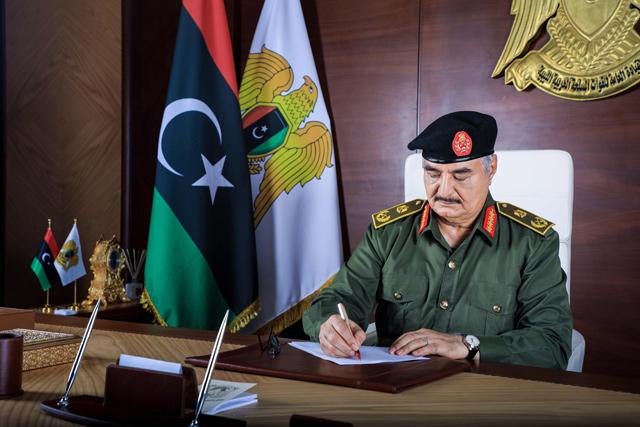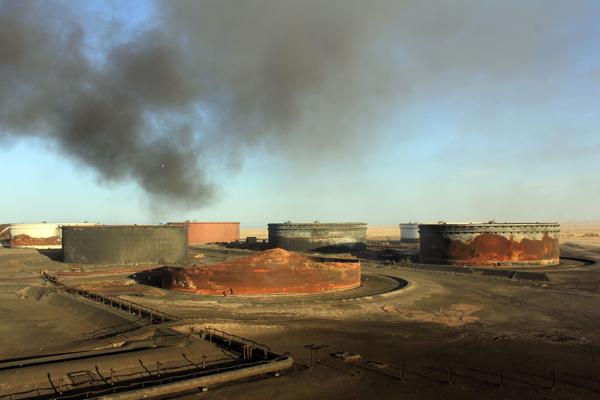You are here
Haftar agrees to lift Libya oil blockade with conditions
By AFP - Sep 19,2020 - Last updated at Sep 19,2020

This handout photo released by the Media Office of the Libyan National Army General Command on Friday shows Libyan General Khalifa Haftar writing on a paper at his desk in Benghazi (AFP photo)
BENGHAZI, Libya — Libyan strongman Khalifa Haftar announced Friday a conditional lifting of a months-long blockade on oilfields and ports by his forces.
"We have decided to resume oil production and export on condition of a fair distribution of revenues" and guarantee they "will not be used to support terrorism", he said on television.
Pro-Haftar groups supported by the Petroleum Facilities Guard blockaded key oilfields and export terminals from January 17 to demand what they called a fair share of hydrocarbon revenues.
Wearing military uniform, Haftar said his forces had “put aside all military and political considerations” to respond to the “deterioration of living conditions” in Libya, which has Africa’s largest oil reserves.
The blockade, which has resulted in more than $9.8 billion in lost revenue according to the National Oil Corporation (NOC), has exacerbated electricity and fuel shortages in the country.
Libya has been in chaos since a NATO-backed uprising toppled and killed longtime leader Muammar Qadhafi in 2011.
The main military fault-line pits Haftar and an administration in Libya’s east against a UN-recognised Government of National Accord (GNA), based in Tripoli.
Haftar’s announcement comes after hundreds of Libyans protested last week in the eastern city of Benghazi, one of his strongholds, and other cities over corruption, power cuts and shortages in petrol and cash.
Protesters on Sunday set fire to the headquarters of the parallel eastern government in Benghazi and attacked the police station in Al Marj.
Police responded with live fire, leaving at least one dead and several wounded, according to witnesses and the UN mission in Libya.
Haftar has the backing of Egypt, the United Arab Emirates and Russia, while the GNA is supported by Turkey. The country’s oil revenues are managed by the NOC and the central bank, both based in Tripoli.
In a statement on Friday before Haftar’s announcement, Mustafa Sanalla, the head of the NOC, lamented the “politicisation” of the oil sector.
“We cannot accept or close our eyes to these practices, which have turned Libya’s lifeblood into a political instrument,” he said.
It would be “impossible to lift” an ongoing force majeure at oil installations when they remain occupied by “foreign mercenaries”, he said, alluding to the Wagner Group, a shadowy private security firm reportedly close to Moscow.
Haftar launched an offensive against Tripoli in April last year, but after 14 months of fierce fighting, pro-GNA forces pushed his troops back to Sirte, the gateway to key oil fields and export terminals.
Related Articles
TRIPOLI — Libya's state oil firm lifted force majeure on what it deemed secure oil ports and facilities on Saturday, a day after strongman K
BENGHAZI, Libya — Libyan strongman Khalifa Haftar has authorised a partial lifting of a months-long blockade of oil terminals to help ease p
BENGHAZI, Libya — Forces loyal to eastern Libyan commander Khalifa Haftar on Sunday seized at least two key oil ports from a rival force loy












